The KP.3 variant
Getty Images
The warning comes after hospital admissions rose by 24 percent in a single week in June
Don't Miss
Most Read
Trending on GB News
A new Covid variant is 'winning' by hitting a 'sweet spot', a leading virologist tells GB News.
Doctor Daniel Rhoads, Head of Microbiology at the Cleveland Clinic, is referring to the KP.3 strain, which belongs to a new group of COVID-19 variants known collectively as FLiRT.
These subvariants descend from JN.1 - the dominant strain at the start of the year.
KP.3 appears to have a growth advantage over its ancestor and this mutational upper hand explains the current rise in cases.
Hospital admissions rose by 24 percent in the week ending June 16 - climbing to 3.31 per 100,000 from 2.67 the previous week, UKHSA data shows.

KP.3's mutational upper hand led a surge in hospital admissions
Getty Images
The number of people hospitalised was highest among the elderly, peaking at 34.70 in the over-85s.
There was also a 29 percent surge in positive cases in the week to June 22, although the majority of testing is now done in hospital and healthcare settings so this may be skewing the figures somewhat.
According to Doctor Rhoads, who also serves as the Vice Chair of the Microbiology Committee, the secret to KP.3's success lies in the evolution of the shape of its spike protein (the route by which the virus gains entry to healthy cells).
Mutations to the spike protein are thought to balance the virus’ fitness (its ability to infect humans and replicate) with its immune escape properties (its ability to evade humans’ immune memory, such as antibodies formed due to vaccines or previous infection), he explains.
"KP.3 is winning compared to other variants at this time because it has found a sweet spot in the combination of fitness and immune escape at this moment in time," he told your correspondent.
Preliminary research backs this up. A paper published by Japanese scientists last month, which was released as a preprint that has not yet been peer-reviewed, revealed that some of the mutations to the KP.3 variant's spike protein indicate it could be more infectious than JN. 1. and have "increased immune evasion".
The researchers conclude that KP.3 could increase the effective reproduction number, or Re - this is the number of people in a population who can be infected by an individual at any specific time.
Although, enhanced transmissibility does not necessarily mean it is more harmful.
LATEST DEVELOPMENTS

The secret to KP.3's success lies in the evolution of the shape of its spike protein
GettyAs Doctor Rhoads points out, there is "no clear evidence" that KP.3 causes more severe illness than other strains.
Others agree with this assessment. A spokesman for the UKHSA is keen to remind GB News readers that we are starting from a "pretty low base" and there's a lot of "noise" in the data.
Thanks to natural and vaccine-induced immunity, we are in a very different place to the early days of the pandemic.
Health officials still say it is important to stop the spread of the virus by recognising the warning signs and self-isolating if you have them.
For most people, KP.3 will cause cold-like symptoms, such as:
- Fever
- Cough
- Fatigue
- Loss of taste or smell
Current Government guidance advises those who test positive for Covid to self-isolate for five days and to steer clear of high-risk individuals, including the elderly and immunocompromised, to prevent serious illness transmission.
The UKHSA has issued similar advice: "If you are showing symptoms of Covid-19 or flu, help protect others by staying at home and avoiding contact with other people, especially those who are more vulnerable."








